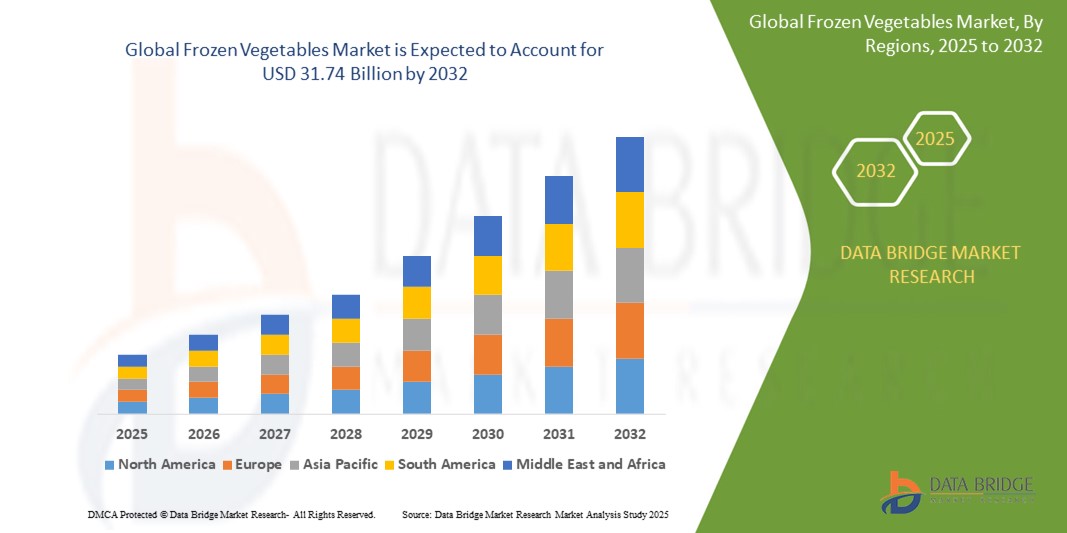“Global Demand Outlook for Executive Summary Frozen Vegetables Market Size and Share
CAGR Value
The global frozen vegetables market size was valued at USD 21.35 billion in 2024 and is expected to reach USD 31.74 billion by 2032, at a CAGR of 5.08% during the forecast period
Frozen Vegetables Market survey report brings into light key market dynamics of sector along with the current market scenario and future prospects of the sector. This finest market research report has been structured with the expertise and innovation of a team of researchers, forecasters, analysts and managers. In this industry analysis report, company profiles of the key market competitors are analysed with respect to company snapshot, geographical presence, product portfolio, and recent developments. The widespread Frozen Vegetables Market document acts as a supreme base for the competitor analysis, analyzing their core competencies, and drawing a competitive landscape for the Frozen Vegetables Market industry.
These key player’s strategies mainly consist of new product launches, expansions, agreements, joint ventures, partnerships, acquisitions, and others that advances their footprints in the Frozen Vegetables Market industry. The utilization of proven tools such as SWOT analysis and Porter’s Five Forces analysis is very helpful in creating such first-class Frozen Vegetables Market research report. The data and information composed for preparing this market report is generally quite a huge and also in a complex form. However, such intricate market insights are revolved into simpler version with the help of proven tools and techniques to provide better experience to the end users.
Get strategic knowledge, trends, and forecasts with our Frozen Vegetables Market report. Full report available for download:
https://www.databridgemarketresearch.com/reports/global-frozen-vegetables-market
Frozen Vegetables Market Exploration
**Segments**
– By Product Type: The global frozen vegetables market can be segmented based on product type into corn, peas, broccoli, spinach, green beans, mushrooms, and others. Different vegetable varieties are frozen for extended shelf life and convenient consumption by consumers.
– By Distribution Channel: Distribution channels in the frozen vegetables market include supermarkets/hypermarkets, convenience stores, online retail, and others. Supermarkets and hypermarkets are key distribution channels due to their wide reach and varied product offerings.
– By End-Use: The market can also be segmented based on end-use into food processing industry, foodservice sector, and retail/consumer market. The food processing industry is a major consumer of frozen vegetables for manufacturing various food products.
**Market Players**
– General Mills
– The Kraft Heinz Company
– Conagra Brands
– Nomad Foods
– McCain Foods
– Green Giant
– Bonduelle
– Ardo
– Pinnacle Foods
– B&G Foods
The global frozen vegetables market is witnessing significant growth due to the increasing demand for convenience foods, changing dietary habits, and advancements in freezing technology. The market is driven by the need for healthy and convenient food options among consumers, particularly in urban areas where hectic lifestyles leave little time for fresh food preparation. Frozen vegetables offer a convenient solution as they are pre-cut, pre-cooked, and retain their nutritional value for an extended duration.
The product type segment of the market is dominated by popular vegetables like peas, corn, and green beans. These vegetables are versatile and can be used in a wide range of dishes, making them preferred choices among consumers. Additionally, the distribution channel segment is witnessing growth in online retail as e-commerce platforms provide a convenient way for consumers to purchase frozen vegetables from the comfort of their homes.
In terms of end-use, the food processing industry is a key consumer of frozen vegetables as they are used as ingredients in various food products such as ready meals, soups, and snacks. The foodservice sector is also a significant market for frozen vegetables as they are used by restaurants, hotels, and caterers to prepare dishes quickly and efficiently.
The market players in the global frozen vegetables market are constantly innovating to meet the evolving consumer preferences and demands. Companies are investing in research and development to improve freezing techniques, packaging solutions, and product quality. Partnerships and collaborations are common strategies adopted by market players to expand their product portfolio and geographical presence.
In conclusion, the global frozen vegetables market is poised for continued growth driven by changing consumer lifestyles, increasing awareness of healthy eating, and technological advancements in food preservation. Market players that focus on innovation, quality, and sustainability are expected to thrive in this competitive market landscape.
The global frozen vegetables market is a dynamic and rapidly evolving industry driven by various factors such as convenience, changing consumer preferences, and technological advancements. One of the key trends shaping the market is the increasing adoption of organic and natural frozen vegetables. As consumers become more health-conscious and environmentally aware, there is a growing demand for organic and preservative-free frozen vegetables. Market players are responding to this trend by expanding their organic product lines and ensuring transparency in labeling to meet consumer expectations for quality and sustainability.
Another significant trend in the market is the rising popularity of plant-based diets. With more consumers opting for vegetarian and vegan lifestyles, there is a growing demand for frozen vegetables as a key ingredient for plant-based meals. Market players are capitalizing on this trend by offering a wide range of vegetable options and promoting the health and environmental benefits of plant-based eating.
The market for frozen vegetables is also witnessing innovation in product packaging and branding. Companies are investing in eye-catching packaging designs, convenient portion sizes, and resealable bags to enhance the consumer experience and differentiate their products on store shelves. Moreover, branding and marketing efforts are focusing on highlighting the nutritional benefits, taste, and versatility of frozen vegetables to appeal to a wider consumer base.
Additionally, the market is experiencing increased competition and consolidation among key players. Mergers, acquisitions, and strategic partnerships are becoming common strategies for companies to strengthen their market position, expand their product offerings, and enter new geographical markets. This trend is expected to continue as companies seek to leverage synergies, economies of scale, and complementary capabilities to drive growth and innovation in the frozen vegetables market.
Furthermore, with the rise of e-commerce and online grocery shopping, the distribution landscape for frozen vegetables is undergoing a transformation. Online retailers and delivery services are gaining traction as convenient channels for consumers to purchase frozen vegetables, offering a wider selection, competitive pricing, and doorstep delivery options. Market players are adapting to this shift by investing in e-commerce capabilities, optimizing their online presence, and enhancing the customer shopping experience in the digital space.
In conclusion, the global frozen vegetables market is a vibrant and competitive industry undergoing rapid changes and innovation driven by consumer trends, technological advancements, and market dynamics. Companies that focus on sustainability, quality, innovation, and meeting consumer needs are well-positioned to succeed in this dynamic market environment. As the market continues to evolve, staying agile, responsive to consumer preferences, and embracing new opportunities will be key to capturing growth and driving long-term success in the global frozen vegetables market.The global frozen vegetables market is experiencing a paradigm shift driven by changing consumer preferences towards healthier and more convenient food options. With an increasing focus on health and wellness, consumers are leaning towards organic and natural frozen vegetables, which are free from preservatives and pesticides. This trend is pushing market players to expand their organic product lines and ensure transparent labeling to meet the demands of health-conscious consumers. Additionally, the rising popularity of plant-based diets is fueling the demand for frozen vegetables as a primary ingredient in vegetarian and vegan meals. Market players are capitalizing on this trend by offering a diverse range of vegetable options and emphasizing the health and environmental benefits of plant-based eating.
Innovation in product packaging and branding is also playing a crucial role in shaping the global frozen vegetables market. Companies are investing in attractive packaging designs, convenient portion sizes, and resealable bags to enhance the overall consumer experience and differentiate their products on retail shelves. Furthermore, branding and marketing efforts are focusing on highlighting the nutritional value, taste, and versatility of frozen vegetables to appeal to a broader consumer base and drive consumer engagement.
The market landscape for frozen vegetables is witnessing increased competition and consolidation among key players through mergers, acquisitions, and strategic partnerships. This trend is aimed at strengthening market positions, expanding product portfolios, and entering new geographical markets to drive growth and innovation. As companies seek to leverage synergies and complementary capabilities, the competitive dynamics of the market are expected to intensify further in the coming years.
Moreover, the distribution channels for frozen vegetables are evolving rapidly, with the rise of e-commerce and online grocery shopping platforms. Online retailers and delivery services are gaining prominence as convenient avenues for consumers to purchase frozen vegetables, offering a broad selection, competitive pricing, and doorstep delivery options. Market players are adapting to this shift by enhancing their e-commerce capabilities, optimizing their online presence, and improving the overall customer shopping experience in the digital realm.
In conclusion, the global frozen vegetables market is a dynamic and competitive industry driven by consumer trends, technological advancements, and evolving market dynamics. Companies that focus on sustainability, quality, innovation, and meeting changing consumer needs are likely to succeed in this fast-paced market environment. Adapting to the shifting consumer preferences and embracing emerging opportunities will be imperative for market players to stay resilient, capture growth, and drive long-term success in the global frozen vegetables market.
See how much of the market the company dominates
https://www.databridgemarketresearch.com/reports/global-frozen-vegetables-market/companies
Essential Analyst Questions for Frozen Vegetables Market Forecasting
- What is the current economic footprint of the Frozen Vegetables Market?
- What is the anticipated pace of expansion for the coming years?
- What are the major classifications outlined in the report?
- Who are the standout performers in this sector?
- What product rollouts have shaped the Frozen Vegetables Market recently?
- What international markets are analyzed?
- Which regional market is expanding the fastest?
- Which country is projected to take the lead?
- What region contributes most to Frozen Vegetables Market value?
- Which country is forecasted to grow at the highest rate?
Browse More Reports:
Global Functional Printing Market
Global De-oiled Rice Bran Market
Middle East and Africa Kidney Cancer Diagnostics Market
Global Lubricity Improvers Market
Europe Dairy Protein Ingredients Market
Global Carbon Disulfide Market
Global Epoxy Glass Flake Coating Market
Middle East and Africa Primary Angle-Closure Glaucoma Market
Global Medical Laser Systems Market
Asia-Pacific Powder Sulfur Market
Global Desmopressin Market
North America Stable Isotope Labeled Compound Market
Global Zinc Citrate Market
Asia-Pacific Breast Implants Market
Europe Endotracheal and Tracheal Suction Market
Middle East and Africa Lymphedema Treatment Market
About Data Bridge Market Research:
An absolute way to forecast what the future holds is to comprehend the trend today!
Data Bridge Market Research set forth itself as an unconventional and neoteric market research and consulting firm with an unparalleled level of resilience and integrated approaches. We are determined to unearth the best market opportunities and foster efficient information for your business to thrive in the market. Data Bridge endeavors to provide appropriate solutions to the complex business challenges and initiates an effortless decision-making process. Data Bridge is an aftermath of sheer wisdom and experience which was formulated and framed in the year 2015 in Pune.
Contact Us:
Data Bridge Market Research
US: +1 614 591 3140
UK: +44 845 154 9652
APAC : +653 1251 975
Email:- corporatesales@databridgemarketresearch.com
“





